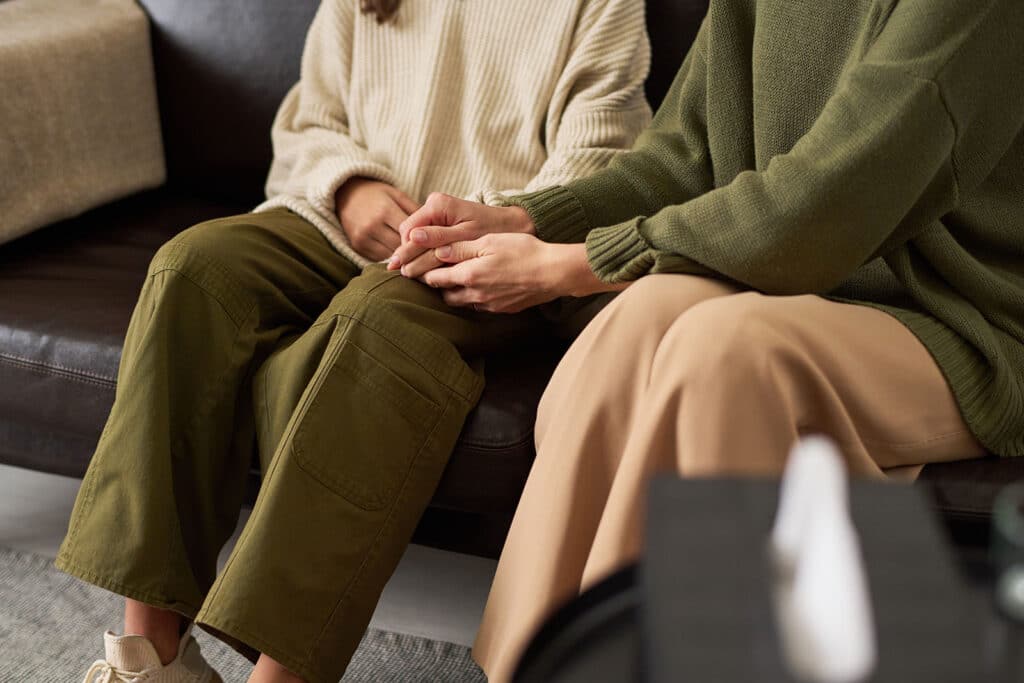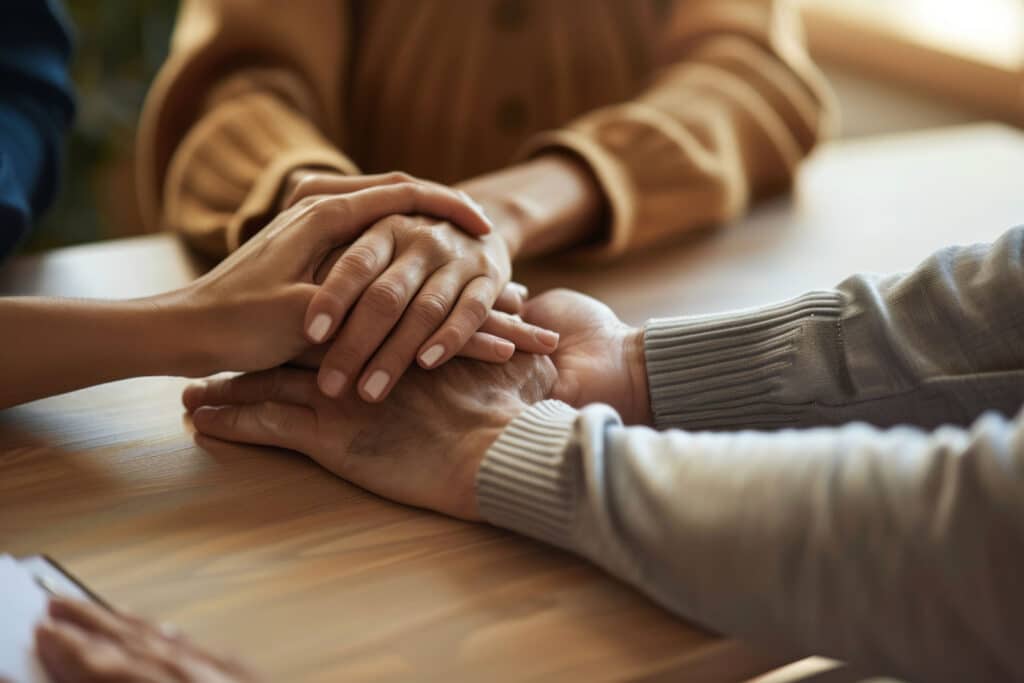As the third largest city in Palm Beach County, Boynton Beach is also suffering the consequences of the drug problem that plagues beautiful Florida with nearly 8,000 overdose deaths in 2022 alone.
Addiction treatment plays a crucial role in fighting the drug abuse issue in Boynton. But for those programs to deliver maximum effectiveness, extra consideration should be directed at aftercare.
In today’s guide, we’re explaining the role of aftercare, its approaches, and its expected timeline.

Table of Contents
What Is Aftercare?
Aftercare refers to the final stage of an addiction treatment plan. It’s also the main course of action that case managers rely on to avoid relapse.
Aftercare is basically any form of treatment, care, or support that a patient in recovery continues to receive after initial detox and rehab.
Aftercare plans aim to help struggling patients overcome their substance use disorder without the 24/7 supervision of a controlled environment. Patients will learn to control triggers and manage urges through a wide range of techniques to maintain sobriety.
Aftercare also makes the transition from a rehab center to a normal home a smoother experience and helps integrate individuals back into the community.
What Are the Approaches Used in Aftercare Addiction Treatment?
When setting up an aftercare plan for a patient struggling with substance use, case managers will first evaluate the patient’s specific case. Aspects such as the type of addiction, the severity of the addiction, the patient’s progress, and the patient’s needs are considered to ensure effective treatment.
After that, professionals decide on the suitable options to implement. To that end, a wide range of aftercare techniques are available to cater to the varying addiction treatment levels, durations, and settings.
Here’s a breakdown of the most common aftercare approaches:

Therapy and Counseling
Besides supervised programs, several types of therapies and counseling sessions are used in aftercare plans. These are a crucial part of aftercare and can be implemented within facility-conducted programs or received alone.
Therapy and counseling deal with the patient’s mental health, which is the most influential factor contributing to substance abuse disorders. Not to mention, it’s the aspect that persists longest after initial treatment.
Examples of therapy and counseling include:
CBT (Cognitive Behavioral Therapy)
This type of therapy enables patients to determine their negative emotions, thoughts, and behaviors and how those link to harmful actions. This helps in preventing the onset of destructive patterns such as substance use.
DBT (Dialectical Behavior Therapy)
DBT is a sub-type of CBT that helps patients identify what triggers their urges and cravings. This plays a significant role in building effective coping mechanisms for controlling impulses that lead to relapse.
MET (Motivational Enhancement Therapy)
Also known as Motivational Interviewing (MI), this type of therapy focuses on helping patients find continuous motivation for resisting urges and upholding a new, healthy lifestyle.
Holistic Therapy
This type of therapy addresses the overall well-being of the patient, be it physically, psychologically, or spiritually. Holistic therapy adopts alternative techniques such as acupuncture, breathing exercises, guided meditation, aromatherapy, pet-assisted therapy, massage therapy, art therapy, and proper nutrition.
Biofeedback Therapy
This type of therapy studies the response of patients to physical and emotional stressors by observing their involuntary reactions to different external stimuli via electronic sensors. These parameters include:
- Blood pressure
- Heart rate
- Breathing rate
- Muscle contractions
- Skin temperature
- Sweating
The resulting data enables medical professionals to develop effective coping mechanisms for cravings during recovery.
Experiential Therapy
Patients receiving this sort of therapy engage in hands-on activities to process suppressed feelings and thoughts to achieve better self-awareness. Common examples of experiential techniques include:
- Adventure therapy
- Music therapy
- Recreation therapy
- Rock climbing
- Wilderness therapy
- Ropes courses
- Sculpting
Faith-Based Drug Rehab
This branch of therapy helps religious individuals work on the spiritual aspect of their recovery process and explore how to handle addiction through their beliefs.

Supervised Programs
This type of aftercare services refers to treatment programs managed by specialized rehab centers. The idea is to have patients come down to the facility to participate in therapy sessions and then leave afterward.
Types of supervised aftercare programs include:
PHP (Partial Hospitalization Program)
PHP patients go to the addiction center at least five days a week and receive about 4 to 6 hours of therapy each visit. This type of program lasts for one to three months and is typically followed by one of the more flexible programs below.
Unlike residential/in-patient programs, patients in PHPs don’t spend the night at the treatment facility. These programs offer well-structured support with enough give to nurture some independence, so they are recommended for patients whose substance abuse disorder is moderate in severity.
IOPs (Intensive Outpatient Programs)
More flexible than PHPs but less flexible than standard outpatient programs, IOPs are meant to encourage a higher level of independence.
Similar to PHPs, patients in IOPs attend therapy sessions at the treatment facility and are free to leave once done. However, the sessions in IOPs are fewer hours and less frequent (usually 2 to 4 hours a day, two or three days a week).
These programs normally last a few weeks up to two months and are best suited for patients struggling with mild to moderately severe substance use disorder.
Outpatient Treatment Programs
Last in the supervised program options is standard outpatient treatment, meant for patients with mild cases of addiction and those transitioning from a PHP or IOP.
It offers the highest degree of flexibility to promote greater independence while still incorporating some time at the facility to keep patients grounded.
This program typically consists of one or two visits per week containing around an hour or two of therapy. It can last from a few weeks to a couple of months.
Sober Living Homes
Transitioning from living under close supervision to complete independence can be overwhelming to many patients, which is where sober living comes in. These facilities provide a healthy, safe living arrangement to help recovering individuals maintain sobriety.
Also known as halfway homes, these can be run fully by peers or supervised by professionals.
Support Groups
Peer support groups, including 12-step programs and non-12-step programs, help patients experience a sense of belonging and rely on relatable individuals for accountability.
Examples of support groups include AA (Alcoholics Anonymous), NA (Narcotics Anonymous), GA (Gamblers Anonymous), DRA (Dual Recovery Anonymous), SMART Recovery, Alumni programs, and Adolescent after-school programs.

What Happens During the First Month After Rehab?
The first month of aftercare doesn’t necessarily include the same practices as it depends on the patient’s case. However, here’s a general overview of what happens during those 60 days:
- Determining the recovery goals and how to accomplish them.
- Learning how to identify and handle negative urges.
- Seek a supportive living arrangement.
- Establish a healthy daily living routine.
- Attending at least two support groups and comparing them to find what works best.
- Finding a therapist or counselor and committing to a therapy schedule.
- Establish a support system with mentors and emergency contacts that can be turned to when urges become overwhelming.
You should note that the duration of aftercare is lifelong in most cases. However, it’s the intensity of supervision that decreases over time.
Conclusion: Avoiding Relapse
Please contact Recreate Life Counseling for additional information about Aftercare Addiction Treatment near you. Our team will help guide you through your addiction recovery journey using a wide arsenal of effective aftercare addiction treatment services.



